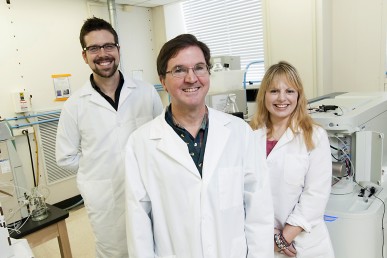Grant will help train natural product scientists

Michael Mullowney, far left, and Elizabeth Martinez, right, are the first recipients of a new federal grant to train UIC students in natural product drugs and dietary supplements. Richard van Breemen, front, is principal investigator of the grant.
Photo: Joshua Clark
Elizabeth Martinez hopes to one day discover a cure for menopausal symptoms using an herbal dietary supplement. With the help of a new federal training grant to the University of Illinois at Chicago College of Pharmacy, her vision may become reality.
The College of Pharmacy has received a five-year, $2.1 million grant to train graduate and postdoctoral students like Martinez in natural product drugs and dietary supplements. The grant is funded by the National Center for Complementary and Alternative Medicine, one of the National Institutes of Health.
“This grant will support the education of the next generation of scientists who will be responsible for establishing the safety and efficacy of dietary supplements and for the discovery of new therapeutic agents from natural product sources,” says Richard van Breemen, professor of medicinal chemistry and director of the UIC/NIH Center for Botanical Dietary Supplements Research.
“The majority of drugs and supplements in use today are derived from natural products,” he said.
The T32-Ruth L. Kirschstein National Research Service Award Institutional Training Grant provides funding to eligible institutions to develop or enhance predoctoral and postdoctoral research training opportunities in biomedical and behavioral research.
The award provides five years of renewable support to institutions, including annual NRSA stipends for trainees and institutional allowances to defray the expenses of those receiving the grant.
To be eligible for a predoctoral award, a student must have a baccalaureate degree and be enrolled in a doctoral program leading to a Ph.D., a comparable research degree, or dual research/clinical doctorate like the M.D./Ph.D. A postdoctoral fellow must have a Ph.D. or M.D. or comparable doctoral degree from an accredited domestic or foreign institution. Trainees are selected by faculty from UIC’s medicinal chemistry and pharmacognosy department.
Two Ph.D. students — Martinez, and Michael Mullowney — were selected as the first recipients of the grant. Both were engaged in other careers before they began studying medicinal chemistry.
Martinez was working as an industrial food scientist when she decided it was not satisfying her need to “make an impact on the lives of people.”
Under the direction of van Breemen, Martinez is now studying how to prevent dangerous side effects caused by drug-herb interactions in menopausal women. She tests plant extracts used in the formulation of dietary supplements for potential connections with drugs that are metabolized in the liver by the same enzymes.
“Preventing harm and improving the quality of life for menopausal women is the driving force of our research,” Martinez said. “This grant will allow me to continue my dream of helping people.”
Mullowney entered the pharmacognosy program after discovering an interest in science while working in illustration and the music recording industry. After earning an undergraduate science degree, pharmacognosy “lured me as a science based in nature,” he said. Its importance can be readily understood by people, “thus reinforcing the environmental value of its natural roots.”
Working in the laboratory of Brian Murphy, assistant professor of medicinal chemistry and pharmacognosy, Mullowney is attempting to discover leads for new antibiotics in marine and freshwater bacteria — sources that he says have been “largely overlooked by traditional drug discovery programs.”
He hopes to one day oversee his own university laboratory.
“I want to be part of the future of medicine that unravels the mysteries of science to more effectively treat humanity,” Mullowney said. “The intersection of biology and chemistry found in the research in UIC’s pharmacognosy department is the perfect next step in my life of creative discovery.”
UIC ranks among the nation’s leading research universities and is Chicago’s largest university with 27,500 students, 12,000 faculty and staff, 15 colleges and the state’s major public medical center. A hallmark of the campus is the Great Cities Commitment, through which UIC faculty, students and staff engage with community, corporate, foundation and government partners in hundreds of programs to improve the quality of life in metropolitan areas around the world.
